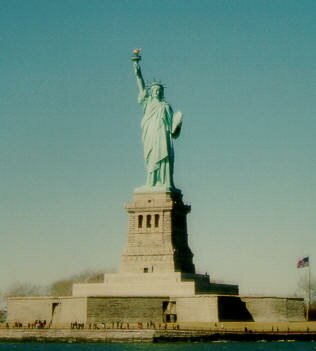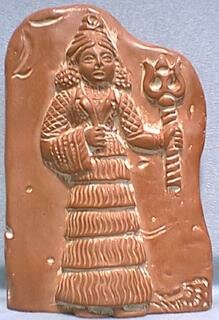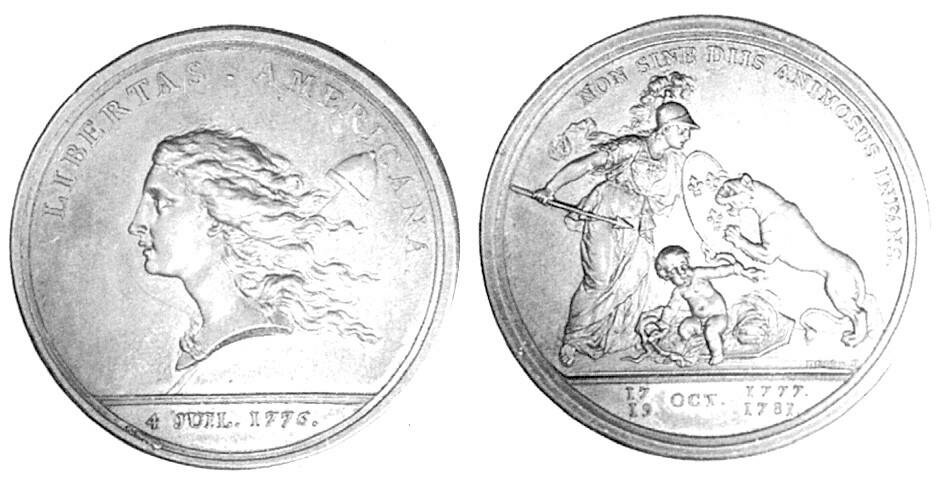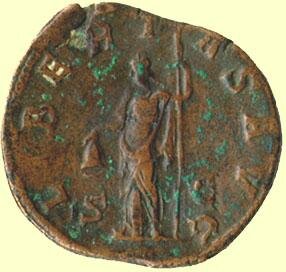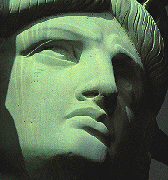The Idols Of America
The Statue of Liberty and Statue of Freedom
Plus Other Icons that are actually "American Babylonianism"
By R.A. Coombes, the author of the most authoritative and exhaustive published works on Mystery Babylon: "America, The Babylon: America's Destiny Foretold In Biblical Prophecy" Volume 1 and Volume 2
"The Alpha-Omega Report" Editor's Note: The information in this article will come as a shock to many readers. It came as a shock to the author while doing 10 years of research for "America, The Babylon." Therefore this warning to those who are convinced that anything but America is Babylon…
Read at your own peril. This information may cause severe disorientation and disillusionment among some diehard American Christians who are convinced that America is God's Chosen Nation. This material below should help to dispel such myths.
Introduction:
The Statue of Liberty has become the most cherished symbol of the United States of America. What we were NOT taught in school were the truly significant facts regarding the true nature of the Statue. Those pertinent facts that remain largely unknown revolve around the true history of the Statue's inception as well as the meaning and significance behind the statue.
French sculptor, Frederic Bartholdi, designed the Statue of Liberty. Bartholdi did not originate the concept of the statue. The idea for creating a statue of liberty and freedom was first proposed by another Frenchman by the name of Edward Laboulaye. It was Laboulaye's idea and determination during the American Civil War that carried the idea from a simple notion to an actual project. Laboulaye, a French Freemason proposed the idea of a giant statue replicating a goddess that the Masonic movement idolized. Laboulaye proceeded to raise the financial support and commission Bartholdi to provide the sculpture of this goddess of illumination from ancient times.
What deity was this? It was the goddess known by various names. Laboulaye and his fellow Freemason, sculptor Bartholdi referred to her as "Libertas" but she was also an early adoption by Romans of the Babylonian goddess Ishtar. We'll need to follow the research on the goddess connections to fully understand this statue's meaning.
Roman goddess Libertas:
Libertas was the name of an ancient Roman goddess adopted by the Romans perhaps as early as the 5th century BC and certainly by the 4th Century BC. She was referred to as the goddess of personal freedom and liberty. In fact Libertas meant freedom. So liberty means freedom. The 2 names describe the one concept we call freedom. Liberty = Freedom and Freedom = Liberty. This goddess was the goddess of freedom because she promoted the ideals for the personal freedom to do anything that felt good. She was called the matron goddess of prostitution because she promoted sexual freedom. Indeed, she had invented the concept. Slaves considered her their goddess in the hopes of winning their freedom. Many women who gained freedom later turned to prostitution to survive and thereby retained Libertas as their goddess, especially if they became priestesses in the Libertas cult. Libertas was also a goddess of war in order to fight for freedom. She was also referred at times as the goddess of victory because freedom must have victory in order to survive. This goddess was also the goddess of immigrants. The whole idea of immigration connoted the idea of freedom. Her popularity was also unique because of her unique doctrine of hearing personal prayers. This unique doctrine was something that most of the pagan deity doctrines were not disposed towards.
We know that this goddess existed because of the records left behind to us. We have the ancient writings of Cicero who writes of this goddess and her Temple on the Aventine Way in Rome. She was depicted on some Roman coins as wearing a freedom cap and having a wreath along with a spear or sometimes a sword. Such coin images were not the only depictions. Sometimes she was well robed and at other times seductively unclothed in both sculptures and paintings. We know of Libertas being referred to as the Mother of Harlots by the famous Roman historian (and senator) Cicero's writings. Cicero indicates that she was also a very early goddess of the Greeks even before early Roman civilization developed.
Upon further investigation we find that the Greeks had acquired knowledge of this being from previous empires in the Middle East and Egypt. This goddess was called Ashtoreth in Hebrew and in the Old Testament's Greek version (the Septuagint). Ashtoreth becomes transliterated into the Greek as Astarte, which became the early Greek name for the goddess until it was later changed to Aphrodite. The Hebrew term Ashtoreth was itself a transliteration from the Babylonian dialect (Akkadian) term of Ishtar.
Ishtar in the most ancient of times was also referred to by the Sumerian dialect as Inanna or Ninanna meaning the Queen of Heaven or Lady of Heaven. In Canaan this deity was called Ashtaroth. The Hittites called her Shaushka. The Phoenicians on Cypress initially referred to her as Astarte. Isis was the name the Egyptians gave to her. This is how the goddess became introduced to the earliest Greeks. We know this transformation in part due to the written texts found by archaeologists plus from studying the character traits and descriptions. For instance all these deities were actually just one goddess and she was associated with the planet Venus. Most had phonetic language roots in the transliterating aspects of the name Ishtar and this remained so until the Greeks changed the name to Aphrodite. Later the Romans referred to her in the Latin, initially as Libertas and later as Venus when they accepted more than just the Liberty doctrines.
ISHTAR: Goddess of Liberty and Personal Freedom
Ishtar was introduced to the Greeks as Astarte through the Phoenicians. We can see that the lineage of the Greek and Roman goddess of the planet Venus goes all the way back to ancient Babylon of around 3,000 BC. Apparently the Greeks (and later the Romans) chose to initially honor only one portion of Ishtar's character and doctrines that appealed to them in those very early years before they established empires. Ishtar's doctrine of personal freedom was what really impressed both the Greeks and the Romans. They therefore chose to worship just that aspect of her character. As time passed, the succeeding generations of Greeks found the other Ishtar doctrines to be appealing and incorporated her into their pantheon of deities as Astarte or Aphrodite. Later still, the Romans did the same and referred to her as Venus.
It seems that the allure of Ishtar was her doctrine of holy sex or salvation by holy sexual relations with a temple priestess or priest as a means of purification and holiness. Of course, this entailed paying the priestess or priest and thus it was officially sanctioned and therefore "holy" prostitution. Ishtar introduced that whole concept to the human race. This is why she was referred to as the Mother of Harlots. Harlots had been deemed to be social outcasts so she was also referred to as the Mother of exiles. This was later equated with the idea of immigration. Naturally then Ishtar (a.k.a.-- Libertas) was known as the Mother of Harlots, the Mother of Exiles and the Mother of immigrants throughout not only Babylon and Babylonia but also later Assyria, Egypt, Greece and Rome.
What was Ishtar's legacy in Babylon? She was the chief goddess of Babylon and all of Babylonia. There was no other goddess more honored than she. She was equated to have nearly the same power as the chief god of Babylon, the sun god Utu, also known as Shamesh. In later years, the chief male deities would flip-flop in popularity. The most famous and prominent during the times of Israel's nationhood was "Baal." [Baal was also called Marduk/Mardok/Merodach/Bel] Baal was identified with the planet Mars and was called the god of War. His name meant "Lord of the air" for his superior powers and the supremacy of the air. It was claimed that he as well as Ishtar and all the
other deities "flew" among and from the "stars in heaven."
Ishtar was a multi-faceted deity. She was first and foremost endeared to the hearts and minds of Babylonians because of her primary dedication to Freedom and Liberty. She was also considered the Mother of Prostitution or Harlotry…and it was considered "holy." Why? Ishtar introduced the concept of removal of sins by the practice of the sinner engaging in a "holy" rite of sexual relations with a priestess or priest. This action would involve the payment of money to the priestess or priest as part of the cleansing process. It was an offering of thanksgiving for the purification. This is the very first instance of Prostitution in human history.
Ishtar was also known as the goddess of war because she fights for freedom and liberty. She was also known as the goddess of victory because there is no freedom without victory. She was also known as the goddess of love because of her sexuality and her promotion of all types of sexual perversion in the name of freedom. Her motto was "if it feels good, do it." Didn't we hear that same idea as a theme song during the 1960s? She was also the goddess of the planet Venus. She was a goddess who "flew among the stars" and so therefore was called the Queen of Heaven or Lady of Heaven.
Zecharia Sitchin, in his book "Divine Encounters" describes another significant role for Ishtar in Babylonia/Sumer. [Note: the earliest Babylonians did not call themselves Babylonians nor their land Babylon. They called their land Sumer and they are referred to as Sumerians.] Now, Sitchin is one of only a handful of scholars who has been able to learn and translate the cuneiform tablet writings of the Sumerians/Babylonians. He has written numerous books detailing various aspects of the culture and writings of Sumer.
In his book "Divine Encounters" he describes a significant role that Ishtar held for the Sumerians. On pages 174 through 176 he describes the annual ritual in which the King of Sumer must come to the special chamber temple of Ishtar to engage in sexual relations with her for one night of passion. If during the night she is displeased with the King in anyway she kills him and a new candidate is selected to undergo another ritual initiation of one night passion. He must perform satisfactorily. This process was to continue until Ishtar accepted a candidate who met with her satisfaction. If the king or candidate found acceptance he would appear the following morning to the expectant crowds outside the temple palace to show that he had gained the favor of the goddess to rule for one more year. Such acceptance also meant that the nation would have a good year of agricultural harvests.
Sitchin also notes that the Biblical references to "daughter of Babylon" always refers to Ishtar of Babylon. She was a Mother of Harlots and also a daughter of Babylon. This seems like a dichotomy of sorts but Ishtar was a daughter of the original founding god of Babylon known as "Anu" who was the ruler of the planet called "Nibiru." Nibiru was an additional planet in our solar system that circled the earth every 3,600 years, according to the royal records of Babylon.
Sitchin has been roundly ridiculed by scientists for proposing that this notion of Nibiru could actually exist. However on June 30, 1999 a scientist, David Stevenson from California Institute of Technology published a paper stating that "interstellar planets" (which is what a "Nibiru" would be called) is certainly a theoretical possibility and should not be dismissed. In the CNN/Reuters News story the text mentions that Stevenson is not alone and that others have theorized that there may be others planets roaming interstellar space that came from our solar system.
Sitchin is also a noted Dead Sea Scrolls scholar. He served in the original investigative group attempting to repair the damaged scrolls. He is an extraordinarily gifted scholar. [See Divine Encounters, Published by Avon Books, NY. NY., 1995; ISBN: 0-380-78076-3]
Now this ritual between Ishtar and the king or king candidate is what the Biblical prophecies are referring to when it talks about the Harlot having relations with the "kings of the earth." In other words, in the prophecies, it is referring to Ishtar approving the rule of the kings because they have pleased her and did as she commanded. See Revelation 17:1-2, 4-5 and also 18: 3, 9 and 19:2. See also: Isaiah 47:1-15; Jeremiah 51:7. It also means that the relationship is a two-way street. Ishtar gives to the kings the necessities to maintain authority and control. In return, the kings of
course swear allegiance to Ishtar and provide sacrifices for her. Revelation provides a symbolic similarity between the ancient historical aspect and a future relationship between a future Babylon and the rest of the nations. Super-power Babylon acts just like an Ishtar and engages in prostitution with the rest of the nations. The context is all with regards to money and materialism. See Revelation 18:1-24 and note how the overall theme revolves around money and material things.
For further verification and follow up research, the reader is encouraged to visit the following sources:
Crane, Gregory R. (ed.) The Perseus Project May, 1999. See also specific page:
http://www.perseus.tufts.edu/cgi-bin/lexindex?lookup=libertas&lang=Latin&author=*Roman&corpus=Roman
Also see this link and scroll down to the letter "L" section and then click on the term Libertas:
http://www.pantheon.org/mythica/areas/roman/
Here are links to more information on Ishtar:
Connecting Ishtar to the Statue of Liberty:
The Statue of Liberty was a Masonic concept conceived from within Freemasonry. The chief promoter and fundraiser for the project was Edward Laboulaye and he collaborated with the sculptor Frederic Bartholdi to develop a statue of Masonic enlightenment. The statue was developed from within the highest doctrines of Freemasonry. This "enlightenment" took its form in various symbols found in the sculpture itself.
#1. The Crown of 7 Spikes: This symbol was to represent the enlightenment of the Babylonian sun god Shamesh/Utu. The idea was that this sun god's occultic illumination could be focused by each of the 7 spikes of the crown. Each spike would flash this occultic enlightenment to each of the 7 "horas" or large landmasses of the world. In other words, the each spike would flash occultic enlightenment to a continent on planet earth. Each of the 7 spikes would then be representative of one of the 7 large landmasses or continents of the world.
#2. The Tablets: A common misconception is that the tablets represent the 10 Commandments that God gave to Moses. This is not true. The tablets are engraved only with the Roman numerals standing for July 4th, 1776. According to the preeminent Statue Historian, Marvin Trachtenberg in his book "The Statue of Liberty" the tablets represented a generic notion of the concept of law. This should not be confused with the Laws of Moses. Freemasonry gives lip service to Judaism, Christianity and Islam as law-giving religions but Freemasonry tries to synthesize all religions into one central focus…the idea of "law" in general. Hence the tablets being held by the Statue of Liberty carry that general meaning.
#3. The Robe: In the original planning, the Statue of Liberty was designed in the initial stages to be in color. She was to be wearing the royal robes of scarlet and purple. It became obvious that for reasons of monetary purposes the statue must be made from copper. The use of copper precluded the use of any color schemes. Thus the original plans for scarlet and purple robes were abandoned.
#4. The Torch: This item was originally designed to be a golden cup filled with the wine of freedom. This golden cup remained in the planning and was actually made. However, before completion and shipping of the entire statue, the New York Port authorities asked if there could be some sort of modification to allow for an eternal flame or light to be designed into the statue so that ships could use her as a night time navigational aid. Bartholdi consented to make modifications to the basic cup design to allow for a natural gas flame to be utilized. The torch we see today is actually the same type of cup design used in ancient times for drinking wine. It featured a handle for the cup at the bottom and the handle looked much like a stick. The golden aspect itself was altered again to conform to the needs of the natural gas flame. The actual, original golden cup was later sold by the project to the Czar of Russia, Czar Nicholas. In 1917 during the Russian revolution the Communist government took possession of it. The cup has remained in Russian hands but in 1997 was reportedly offered for sale by the Russian government to help pay off Russia's foreign debts. This author has not been able to determine whether or not the cup was actually sold or not. It is only known that the cup is still in existence.
#5. "Mother of Exiles" is a key term in the poem by Emma Lazarus. In her famous poem about the statue, (now etched into the base of the statue) Lazarus refers to the woman as "The Mother of Exiles". The poem has forever indelibly linked the statue to immigrants from around the world. The statue is the patron "saint" of immigrants everywhere. Oddly enough, the Babylonian goddess Ishtar was also the patron goddess of immigrants in Babylon because as a goddess of personal freedom, she brought hope to immigrants seeking to make a better life for themselves in Babylon. So too for this "Mother of Exiles". In fact, if we try to transliterate the English term "Mother of Exiles" into the Greek… Mother as a word has similar phonetic sounds. Doing the same with "exiles" from English into Koine-Greek, the Koine-Greek listener would link it to a similar Greek word that connoted deep inhalation of air or "heavy breathing." This is tied into the Greek word "epithumia" which in English is normally translated as "lust" but the literal meaning in Koine-Greek meant literally "heavy breathing" and was connoted with desire. Now this terminology is then linked to the word "Porneoh" from which we get the word Pornography. Porneoh=lust fulfillment by sexual relations in exchange for money…which again was the main claim to fame for Ishtar… holy sexual prostitution. Ishtar worship is the very first instance of prostitution in human history and it was deemed "holy!" Now, this may indeed just be an interesting coincidence but remember Revelation 17:5 where the woman called Mystery Babylon is referred to as the "Mother of Harlots."
Scriptural traits of the woman of Revelation chapter 17:4.
The woman is described in Revelation 17:4 as having a golden cup in her hand. This fits in with the Statue of Liberty, who has indeed a golden cup in her outstretched hand. (See the Statue of Liberty Website Link to see a picture of the original golden globe flame, which replaced the original cup when NYC authorities asked to modify the cup to a light source for shipping. The original golden cup was then sold to the Czar of Russia, where it remains today. Here's the link: http://www.nps.gov/stli/prod02.htm#Statue
This cup is described as having "bdelugma" in the Greek text. You will see it in the KJV word "abominations." Now this word is Strong's Code #946. It means a foul thing, detestable, usually of idols…it comes from the root word bdeoh= "to break wind" or "pass gas"…it is something that is very smelly and extremely offensive. Now, the Statue of Liberty has inside the torch the fuel for its flame… "natural gas" or bdelugma. Is this a coincidence between scripture and the Statue of Liberty? I suggest strongly that this is no coincidence. The torch is actually being described in Revelation 17:4 as is the woman. The woman in Chapter 17 is the symbol for the super-nation that is code-named "Mystery Babylon." But this is not the only connection between the Statue and the woman of Revelation 17:4.
The crown of 7 spikes is also being described in Revelation 17:9. Here we see the woman referred to as sitting on 7 "horas". This is the same word that the mystical religion of Freemasonry doctrines uses from the Greek mystics who kept the doctrine alive from Ishtar worship. The idea of the enlightenment of the sun god Shamesh-Utu…or Rah in the Egyptian language was that it would be shined to all of the 7 "horas" or continents of the world. These Greek mystics used that Greek term "horas". Marvin Trachtenberg in his book on the Statue of Liberty
(Viking Press, 1977) refers to the crown's 7 spikes as doing just that. It was to enlighten the 7 continents with Shamesh's occultic wisdom. Revelation 17:9 uses that same terminology.
Now, the KJV and the NASB English versions translate "horas" as meaning "mountain." Mountain is indeed the normal meaning of the word in Greek. But the Greeks general and overall root word basis was "large land mass" for which mountain usually fit the definition. Unfortunately some new translations miss this point entirely and have translated the word "horas" as meaning hill. This comes from the erroneous assumption that the verse is referring to the 7 hills of Rome and that the woman is Rome. This is a wrong assumption. Moulton & Milligan's Greek Vocabulary cites that the correct word for "hill" in Koine-Greek (and in other Greek dialects) was the Roman word "bounos" and this was always the word that was to be used when referring to the 7 hills of Rome. After all, this was the Greek word that was borrowed from the Romans. Everyone referred to Rome's 7 hills as "bounos" …and not "horas". Therefore, the assumption that Revelation 17:9 refers to the 7 hills of Rome is complete error. The verse then must be referring to the continents where the Woman's enlightenment rays are flashed from her 7 spikes in her crown.
Now some skeptics will point out that no crown is mentioned in Revelation 17:4. However, Revelation 18:7 calls her Queen and what do all Queens wear to prove their position as a Queen? A crown. This is also substantiated by Isaiah 47: 1-9… where in the KJV she is referred to as a Lady…but in the original Hebrew the word designates female royalty as either Queen or Princess. So here again we have a connection between the woman and another scriptural passage that is very subtle in its attempt to signal to us the identity of this woman. It is a signal that couldn't have been known nor comprehended for 1800 years.
The Statue of Liberty -- The Largest Idol Ever Made By Human Hands.
In doing the research into the statue, I discovered that no statue has ever been made that was as big as the Statue of Liberty. The previous record holder was the Colossus of Rhodes.
We can recognize the match-up between the Woman of Revelation 17:4-5 and America when we realize that the Statue of Liberty is actually the goddess Ishtar of Babylon…the mystery goddess of Babylon who was the goddess of personal freedom and liberty. Ishtar was called the goddess of love and sexual freedom, the Queen of Heaven and the Queen of Babylon. Most importantly, Ishtar was called The Mother of Immigrants, AND she was called THE MOTHER OF PROSTITUTES… Then of course, if we throw in the facts that we know about the Babylonian symbolism of the Statue and relate it back to Revelation 17:4, 9… we then have the link between the Statue of Liberty and Revelation 17 and 18.
Understanding the phrase "Mother of Harlots."
Let's examine what the term "mother" means. The term refers to the act of giving Birth or of bearing to fruition of something in its most generic form. In this case, the reference is obvious in that the woman is bearing forth or starting something. In regards to apocalyptic symbolism the connotation is that of a "starting point." The term "Harlot" of course means prostitute. The term in Koine-Greek is "porneoh" and refers to sexual relations in exchange for money.
Now, those who wish to claim that Revelation 17:1-9 is all-symbolic of a false church fails to understand the basic terms here. They make the mistake of separating chapter 17 from chapter 18. Then they fail to understand that the terms are clearly referencing the goddess Ishtar and her doctrine of holy prostitution. Salvation by sexual prostitution is the key doctrine of the mystery religion of Ishtar. Indeed Ishtar's religion was always called a "mystery." In Revelation the key aspect of the mentioned prostitution is money and power. This is the whole ongoing theme of chapter 18, especially verses 3, and then 9-19 and 22-23. Then again in Revelation 19:2. So, Revelation 17 has nothing to do with spiritual harlotry as one thinks of the metaphors for Israel. In Revelation 17 and 18 this Mystery Babylon plays spiritual harlotry primarily in the aspect of money and power. Of all the reasons in scripture given for her divine destruction all the reasons reference back to the abuse of power and money and her rejection of God's sovereignty. See chapter 9 of my book: "America, The Babylon."
Now, let's see if we can organize this material into an easy to see chart to compare the scriptural description and put it side by side with what we know about the Statue of Liberty.
Below is a link to the official US government website for the Statue of Liberty.
http://www.nps.gov/stli/prod02.htm#Statue
See also the book: "The Statue of Liberty Revisited -- Essays" and this book was edited by Wilton S. Dalton and Neil G. Kotler, Published by
Smithsonian Institution Press, Washington, D.C.
| Statue of Liberty Traits | Description Woman of Rev 17/18 |
| Clothing: Originally designed w Purple Robe & Jewels gold edging by scuptor but due to budget and wear constraints was dropped. | Clothing: The woman is Robed in Rev 17:4 with a scarlet and purple robe with gold edging and bejeweled. |
| Golden Cup: modified into natural gas torch | Golden Cup: with gaseous smell like flatulence |
| Cup/Torch Contents: Smelly Natural Gas initially | Cup Contents:"Bdelugma" in Greek as in "breaking wind" |
| Name: "Mother of Exiles" a term of reverence linked to the immigrants coming to USA and being saved from a bad future to a future of life and hope. Name originally: Goddess Libertas - A Roman goddess of 600 to 400 B.C. later Venus. Romans borrowed her from Babylon initially just for her Liberty doctrine but later absorbed the other doctrines of Ishtar. |
Name: "Mother of Harlots" -- A title of holiness, or sinlessness referring to the Babylonian goddess Ishtar who held that title and who by her mystery doctrines did inhabit a priestesses body during ritual sexual relations for the removal of sins and spiritual life. Afterwards a coin-offering is given. Ishtar also called the Goddess of Freedom/Liberty and was matron goddess of slaves and immigrants. |
| Crown of 7 Spikes: To reflect the light of the sun-god Utu a.k.a. Shamesh to each of the 7 continents of the world according to diary of Freemason-sculptor Bartholdi. Bartholdi's Freemason influence comes from Masonic doctrines that match the Mystery Doctrines of Ishtar/Inanna/Aphrodite/Libertas. This is referred to as the "Crown-Enlightenment" doctrine that was such a key part of the Mystery Doctrines of Ishtar Worship. | Crown -- Rev 18: 7 Sits a Queen and Queens wear a crown. Each of Ishtar's 7 spikes Crown were to reflect the enlightenment of the Sun-god Utu/Shamash to each of the 7 HORA (continents) of the world. This is the same Greek word as found in Revelation 17:9. Hora means large land mass as in continents or mountains or deserts but NOT a hill The Romans & Greeks never used "hora" for 7 hills of Rome, they used the term bouno, the correct term for 7 hills of Rome. Therefore Revelation 17:9 cannot refer to Rome...thus that verse refers to the Ishtar/Libertas -- Statue of Liberty "crown-enlightenment" doctrine. |
| Goddess of Liberty/Freedom: God- dess Libertas - A Roman goddess of 600 to 400 B.C. later Venus. Borrowed from Baby- lon initially just for her Liberty doctrine but later absorbed the other doctrines of Ishtar and became Venus, Goddess of Love. | Goddess of Liberty/Freedom: Goddess Ishtar was also called the Goddess of Freedom or Liberty and was matron goddess of slaves and immigrants. Just one of her many "mystery" doctrines. She was also called "goddess of Love" and many other titles. |
| Looks East Towards Babylon, Long Island and much of the entire NYC metro. | Woman is the "mega-city" called "Babylon-the mega" or Babylon the "super". |
| Overlooks the waterway approach to the UN where the leaders of the world come to meet at least once a year. | Woman/City has "supervening authority around or over (the place or location) where the Kings of the Earth meet. Rev 17:18 and also Jeremiah 51:44 |
| Statue of Liberty & the Jews: Gazes out over the location of the largest concentration of Jewish people in the world, even more so than in all of Israel. | The Woman & the Jews: Revelation 17:5 The Harlot of Babylon hosts the largest population of Jews just as in ancient Babylon. |
| America's goddess Libertas: Goddess of Freedom | Babylon's chief Goddess Ishtar: "Mother of Harlots |
|
|
|
|
|
|
|
|

|
The Statue of Freedom
This statue stands atop the United States Capitol building on top of the dome. This building is of course the location where both houses of Congress meet to conduct the business of the nation and pass laws. The Statue of Freedom was designed by another Mason, Thomas Crawford. He too designed the statue to be his rendition of the Roman goddess "Libertas." We have already covered the connection between Libertas and Ishtar, so we won't restate the facts on this issue. Suffice it to say that this statue shows the goddess in the garb of a warrioress… another character trait of
Ishtar. She was also called the warrior goddess because she would fight for personal freedom and liberty. So, we have the second largest idol made by humans hands and it stands atop the location where our lawmakers meet. We again have another occultic symbol over the heads of lawmakers of the USA. Is it any wonder the nation is in the shape it is in?
See the links to the US Library of Congress website:
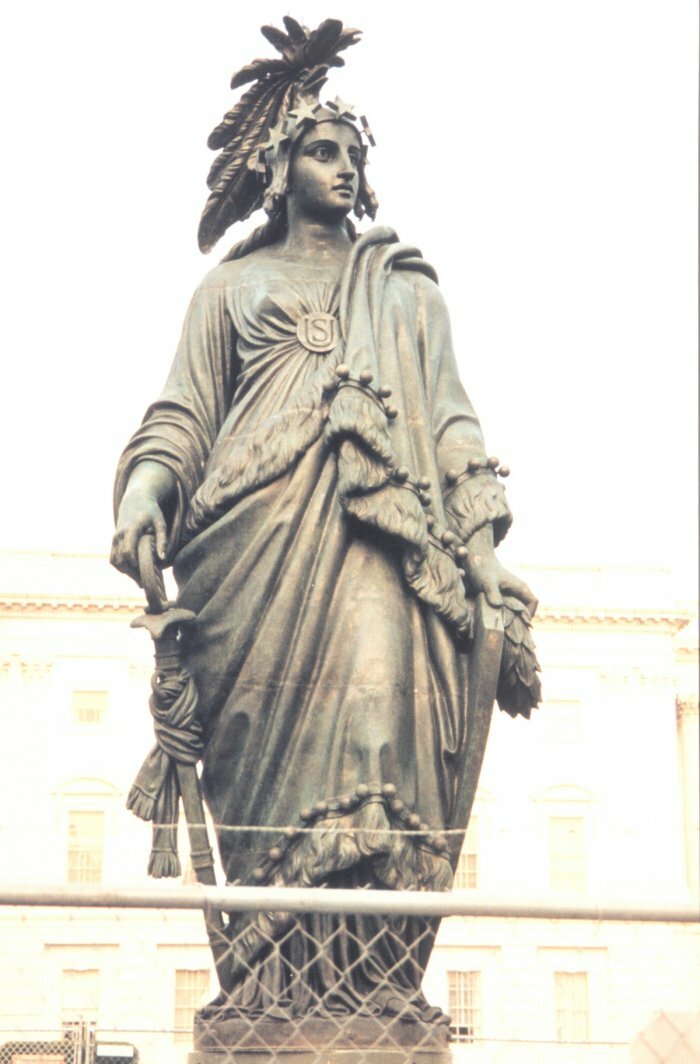
See also the government publication:
"We, the People: The Story of the United States CAPITOL" published by The United States Capitol Historical Society, in cooperation with the National Geographic Society, Washington D.C. The 1964 edition. This references the Statue of Freedom as being the "goddess Freedom" of Rome… i.e. "Libertas".
Other Idols of the US Capitol building:
There are numerous statues and paintings of some of the classical gods of Greece and Rome. One thing government tourism booklets don't tell you is that these deities were borrowed …from Babylon herself.
Here is a picture of the god "Mars" which the Babylonians/Sumerians referred to as Mardok/Marduk/ and or Baal/Bel. Baal is the infamous name which the Old Testament prophets were constantly battling to keep the Israelites from worshipping after the glory days of Solomon. So, here again is another large idol located where our lawmakers meet.
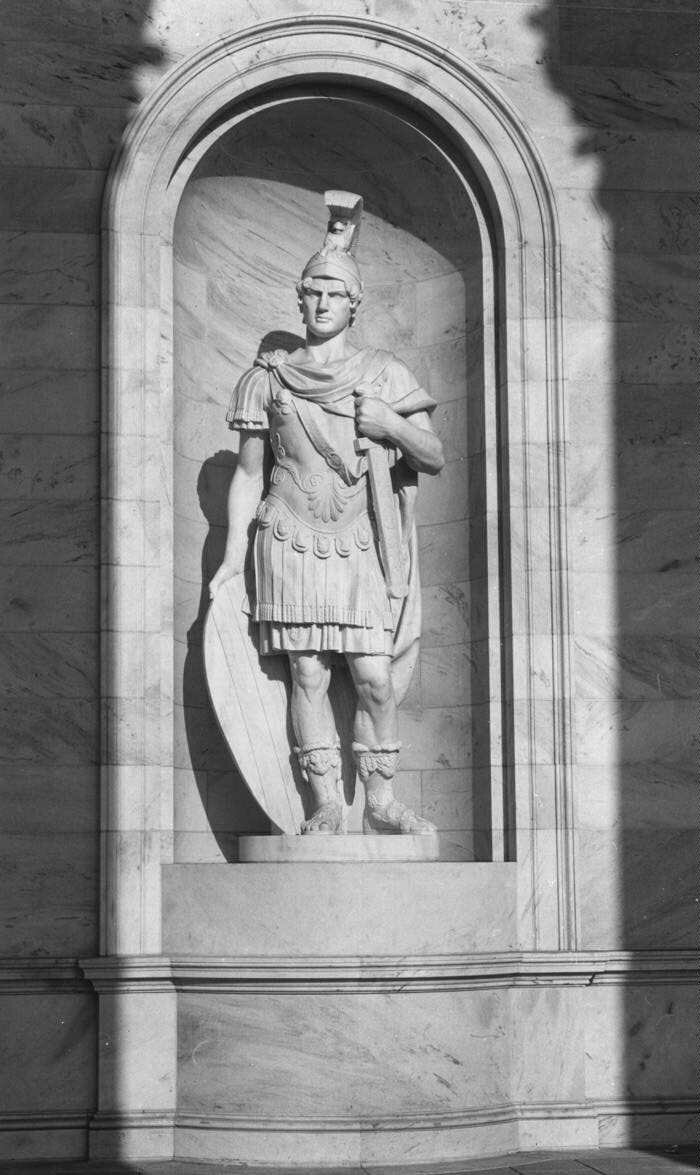
The Greek god "Mars" Stands Guard at the main entrance to the US Capitol Building
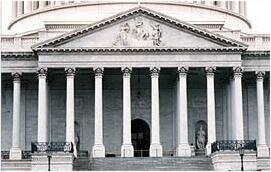
Keep in mind that the Greeks borrowed their "Mars" from the Babylonian deity "Baal" a.k.a. Bel or Marduk/ Mardok/Merodach. Yes, this is the same deity that the Old Testament prophets fought against in the generations after David and Solomon. http://lcweb.loc.gov/exhibits/us.capitol/ksixteen.jpg
There are other lesser known deity statues and paintings in and on or around the US Capitol building. Search the US Library of Congress website for various statues of the Capitol building. You'll find statues of "Athena, Minerva" and many more. You'll also see numerous paintings in the earliest years referring to the Capitol as the "Temple of Justice."
Conclusions:
The are just too many coincidences when we compare the characteristics in the scriptures relating to the woman called "Mystery Babylon -- "Mother of Harlots" with that of Ishtar of Babylon and the Statue of Liberty and the Statue of Freedom. What we conclude:
The Statue of Liberty is the woman being described in Revelation 17/18 and especially 17:4-5, 9 and 18:7 along with Isaiah 47:1-15. We say this because we know that the Statue of Liberty is actually the artist/sculpture's vision of Ishtar, the goddess of Babylon!!! This makes the Statue of Liberty the largest Idol ever made by human hands, and the Statue of Freedom being the second largest idol and it stands atop the building where our lawmakers meet.
Is it any wonder that our Congressional lawmakers seem to be so perpetually "screwed up?"
The reference to "Mystery Babylon -- Mother of Harlots" is referencing Ishtar, the Mother of Harlots of Babylon…and her "mystery doctrines" such as salvation by sex for money. There are numerous other statue of other pagan deities in the US Capitol building and around the nation's capitol city. America is indeed the Mystery Babylon of Revelation 17 and 18.
For more information on "America, The Babylon" click here.
Copyright © 1999, 2000, 2001, 2002, 2003 by R.A. Coombes
All publishing rights reserved
No commercial re-publishing of this article is permitted without prior written consent.

